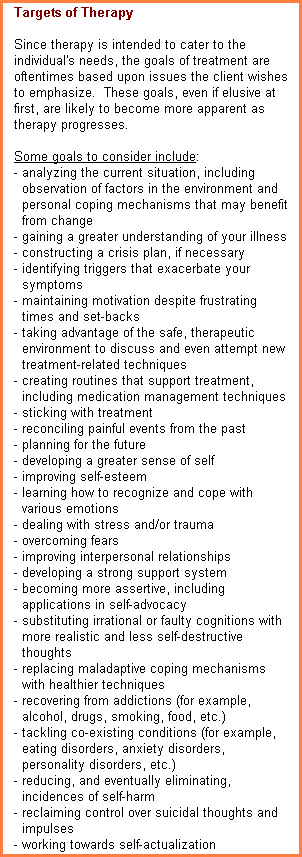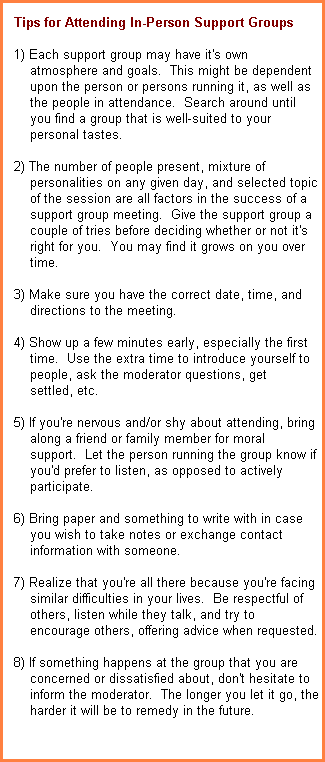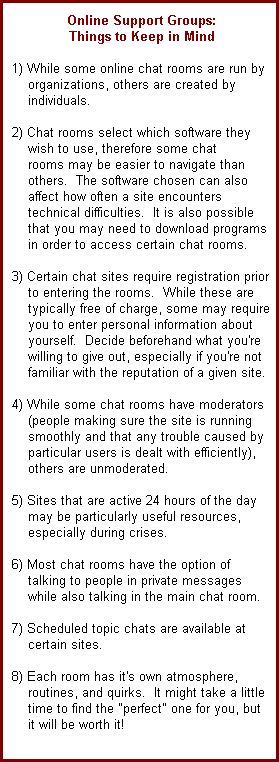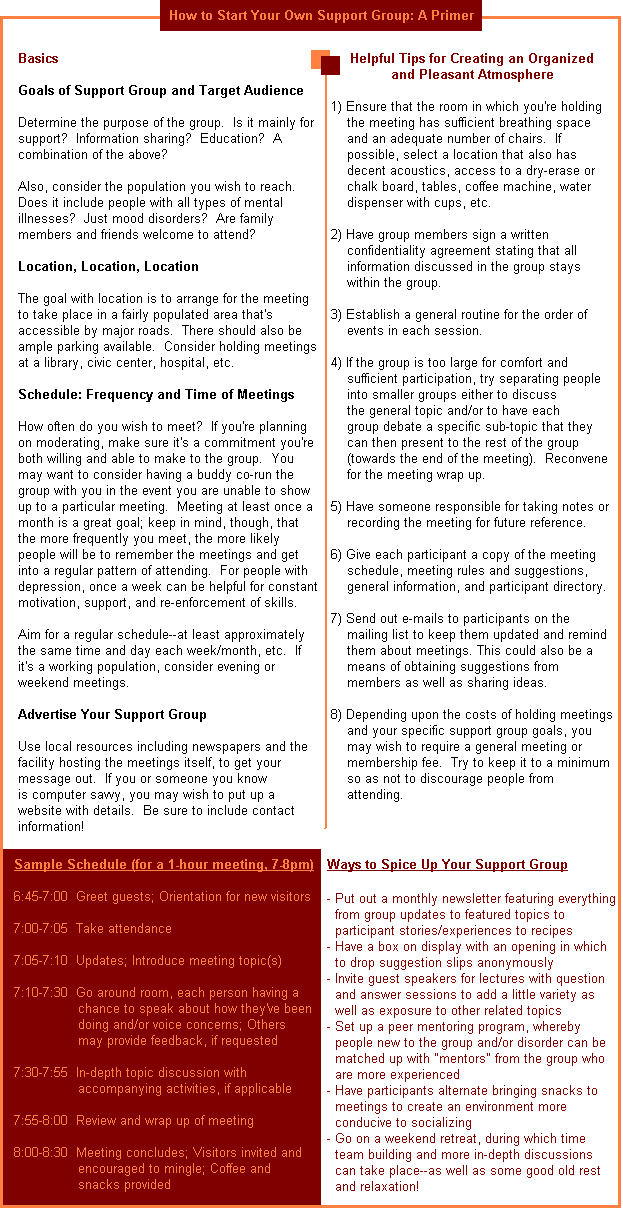

Types of Psychotherapy
Cognitive
Behavioral Therapy (CBT)
Based on an educational model, CBT examines
thoughts, or cognitions, to identify and rectify faulty thought processes
negatively impacting behavior. It is a fairly structured approach,
usually including "homework" for the patient. An example of
this method is the following: A rather perfectionist student
thinks to himself, "Ugh. I got a C on that exam. Now I'm
never going to get into college. I'm a complete failure."
That statement contains two major cognitive errors: the negative prediction
with no true basis ("...never going to get into college") and black-or-white
thinking ("I'm a complete failure.")
Dialectical Behavioral Therapy
(DBT)
As a hands-on skills building program, DBT incorporates elements
of many of the therapies, including analysis of how cognitions and
emotions influence the client's behavior. The four highlighted
skill groups include: core mindfulness (being in the moment), interpersonal
effectiveness (interactions with others), emotion regulation (identifying
and exerting control over emotions), and distress tolerance (dealing
with crisis or extreme discomfort). DBT can be done on an individual
basis, but it's recommended as part of a group setting.
Gestalt
Therapy
Based on the concept that we experience things in the present
and define ourselves in relation to aspects of our external environment,
Gestalt therapy strives to help the patient better understand himself,
improve the here and now, and effectively respond to everyday challenges.
Humanistic
Therapy
The scope of humanistic therapy is quite broad comparatively,
focusing on personal growth in the forms of self awareness,
self regulation, and self actualization. The therapist sees
the patient as having unique needs and strives to work with
the patient to discover and fulfill these needs in a warm, non-judgmental,
supportive environment. Goals might include gaining a sense of
wholeness in one's life and becoming independent, while still appreciating
one's natural tendency to look to others for guidance and assistance.
Interpersonal Therapy
Focusing on the client's relationship with
others, particularly as those interactions affect mood, interpersonal
therapy looks at issues such as argumentative behaviors, transitions
into various roles, grief, oversensitivity to criticism, etc., and
provides an opportunity for the patient to identify, analyze, problem
solve, and practice (perhaps through role play) in a safe and
therapeutic milieu.
Psychodynamic Therapy
Explores
events and memories of the past in order to gain insight into personal
motivations and
detects correlations between past events
and current problems. This can be accomplished through
techniques tapping into the subconscious processes including
dream analysis, free associations, and transferences.
References
"A Novel Convulsive
Therapy for Depression"
Neuropsychiatry Reviews,
Vol. 5, No. 7
September 2004
www.neuropsychiatryreviews.com
Abnormal Psychology
Susan Nolen-Hoeksema
The McGraw-Hill Companies, Inc., New York, 2004
"Best of Doc-Talk:
Support Groups"
http://www.asgs.org/SuppGrps.html
Chinese
Medicine: A Comprehensive System for Health and Fitness
Tom Williams, Ph.D.
Element Books Limited, Great
Britain, 1996
"Drug Treatment"
www.intelihealth.com
Feeling
Good: The New Mood Therapy
David D. Burns, M.D.
Harper Collins Publishers, Inc., New York, 2000
InteliHealth
www.intelihealth.com
MedlinePlus
www.nlm.nih.gov/medlineplus
"Psychiatric
Medications"
American Psychiatric Association
www.psych.org
"Psychotherapy: How it Works and How it Can Help"
Depression and Bipolar Support Alliance (DBSA)
www.dbsalliance.org
"Psychotherapy
Treatment"
www.mental-health-matters.com
"Recent
Developments in Atypical Antipsychotic Medications"
www.healthyplace.com
RxList
www.rxlist.com
Skills
Training Manual for Treating Borderline Personality Disorder
Marsha M. Linehan, Ph.D.
The Guilford Press, New
York, 1993
"Traditional Therapies"
SAMHSA's
National Mental Health Information Center
http://www.mentalhealth.org/
The
Center for TMS
www.centerfortms.com
"Vagus
Nerve Stimulation"
Neurology Channel
www.neurologychannel.com
Treatment Options, Part 2: Psychological Treatments
Therapy
Options
Individual Therapy
One-on-one therapy solely involves
the client and therapist. The undivided attention allows for
the freedom to sculpt treatment into an individualized form, as well
as have it continue at a pace most comfortable and beneficial to the
client.
Couples/Family Therapy
In this case, the therapist
may assume a mediator role, helping resolve differences between individuals,
in addition to educating family members about their loved one's illness.
Involvement of the family in treatment can also lead to improved communication
and can open up a discussion regarding ways in which the family
member(s) can help the individual with mental illness cope in everyday
situations.
Group Therapy
Groups, led by therapists, may
contain somewhere between 4 and 12 people, all dealing with similar
(if not the same) issues. They provide forums for discussion,
debate, sharing, and learning, as well as give the therapist an opportunity
to observe a client's interactions with other individuals.
Support
Groups
Although support groups are not always led by professionals,
they can still be quite beneficial in that, like group therapy, they
offer support and the knowledge that one is not alone in his or her
quest to beat the illness. They tend to be more relaxed than
formal therapeutic settings, sometimes even meeting for social events
in addition to regular meetings.

DBSA Support Groups
The Depression and Bipolar
Support Alliance offers peer-run support groups around the United
States, parts of Canada, and in select locations abroad. To
locate the chapter nearest you, plug in your zip code and the number
of miles you are willing to travel:
This section introduces a variety of topics pertaining
to psychological treatment: psychotherapy, therapy options, types
of psychotherapy, and support groups--both attending them, as well
as creating your own.
Navigating through the
storm...








